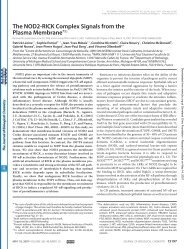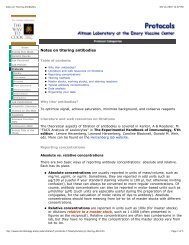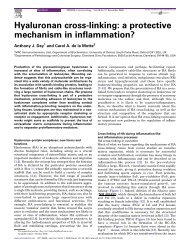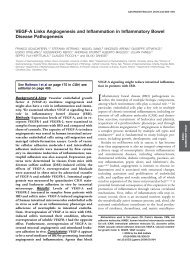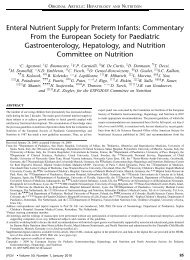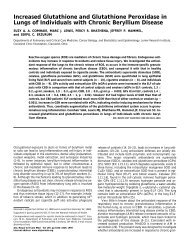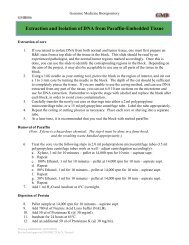Scientific Report 2003-2004 - Cleveland Clinic Lerner Research ...
Scientific Report 2003-2004 - Cleveland Clinic Lerner Research ...
Scientific Report 2003-2004 - Cleveland Clinic Lerner Research ...
- No tags were found...
Create successful ePaper yourself
Turn your PDF publications into a flip-book with our unique Google optimized e-Paper software.
We are focusing on three main projectsrelating to multiple sclerosis:Longitudinal Autoreactivity to Central NervousSystem AntigensVery little is known about the relationship betweenimmune cytokine responses (particularly towardsbrain components, such as myelin proteins) and clinicalparameters that are used to assess disease progression inmultiple sclerosis. We performed a longitudinal study thatinvolved mapping of IFNγ and IL-10 cytokine responsesto myelin peptides in MS patients/controls. Cytokine expressionpatterns were correlated with clinical findings,demographic factors and diagnostic measures includingquantitative MRI. Our results show that following MS patientsover time by analysis of their cytokine patterns tellsus that these important immune chemicals can be linkedto MS patients’ disability but do not appear linked to anyparameter in healthy controls. Certain immune tissuetypes are strongly associated with MS and now appear tobe strongly associated with specific immune cytokineresponses that we can observe at multiple points in time.Immune responses to specific regions of myelin proteinswere highly dynamic over one year of observation andappeared to show bursts of activity coordinated withgadolinium enhanced MRI lesions. We have identified 3patterns of longitudinal reactivity to myelin proteolipidprotein (PLP): I = no reactivity at any timepoint; II =isolated peptide reactivity; and finally, III = generalized“bursts” of reactivity across the entire PLP molecule.Interestingly, no MS patients fell into category I, whereas85% of MS patients showed pattern III compared to only59% of controls. These findings suggest that our methodsare useful for tracking immune events that are linkedto disease disability and may provide beneficial markersfor clinical trials in MS. In addition, these data suggest thatinflammatory cytokines may play a role in progression ofMS and should be considered as targets for therapy.Gender Differences in Immune Response in MSWomen develop MS almost three timesmore often than men. To better understand this“gender gap in autoimmunity,” we are examiningsex differences in multiple immunologicalparameters that may show sexually dimorphicresponses. One of these parameters includesmeasuring inflammatory and regulatory cytokines.Our results show that IFNγ secretion to myelinpeptides and proteins, although heterogeneous,tends to support our previous findings: thatThe Department of NeurosciencesInflammatory, Immunomodulatory CytokinesStudied in Triad of MS <strong>Clinic</strong>al Projectsfemales secrete more IFNγ than males. Anotheraim was to determine if the addition ofexogenous sex hormones can alter the expressionof cell-surface molecules that promote cellularinteractions–known as co-stimulatory moleculeslike CD40L, CD86 and CD80. We observe thatexpression of some co-stimulatory molecules insome individuals respond to in vitro exposure tosex hormones, and specifically to hormones thatare elevated in pregnancy. Finally, measuringexpression of chemokine receptors on lymphocyteswill help us to learn if these importantchemical messengers play a role in male/femaledifferences in MS. A better understanding of thegender bias in MS may allow development of newtherapies that capitalize on the differentimmunological responses in women versus men.Immunomodulatory Effects of MS TreatmentPatients with the most rapidly debilitatingform of multiple sclerosis (MS), primaryprogressive MS, have virtually no therapiesavailable to them. A newly approved therapy forthese MS patients is mitoxantrone; however, itsunderlying mechanisms of action are poorlyunderstood. Mitoxantrone has been found toregulate the generation of T-helper and T-suppressor cells via effects on macrophages.Several soluble mediators elaborated by macrophagescould be responsible for this effect. We aremeasuring communicating cytokines thatmacrophages secrete to upregulate/downregulateT-cell functions. We also examine the effect ofmitoxantrone treatment on soluble levels ofinflammatory mediators in the serum of primaryprogressive MS patients. Chemokine receptorsare frequently correlated with inflammatoryprocesses and have been linked to diseasepathogenesis in MS. Our recent studies focus onthe effect of mitoxantrone treatment on thesurface expression of chemokine receptors onlymphocytes. Understanding the mechanisms ofaction of mitoxantrone will help in improvingtherapy for this highly debilitating form of MS.THE PELFREYLABORATORYADVANCED POSTDOCTORALFELLOWIoana Moldovan, M.D., Ph.D.SENIOR RESEARCHTECHNOLOGISTAnne Cotleur, M.S.TECHNOLOGISTNatacha Zamor, B.S.COLLABORATORSRobert Fox, M.D. 1Matt Karafa, Ph..D. 2Jar-Chi Lee, M.S. 2Paul Lehmann, M.D., Ph.D. 3Richard A. Rudick, M.D. 1Lael Stone, M.D. 1Vincent Tuohy, Ph.D. 4Brian Weinshenker, M.D. 51Mellen Ctr. for Multiple Sclerosis,CCF2Dept. of Biostatistics andEpidemiol., CCF3Case Western Reserve Univ.,Dept. of Pathol., <strong>Cleveland</strong>,OH4Dept. of Immunology, CCF5Mayo <strong>Clinic</strong>, Dept. of Neurol.,Rochester, MNClara M. Pelfrey,Ph.D.Pelfrey, C.M., Rudick, R.A. , Cotleur, A.C., Lee, J.-C., Tary-Lehmann, M., and P.V. Lehmann(2000) Quantification of self-recognition in multiple sclerosis by single-cell analysis of cytokineproduction. J. Immunol. 165:1641-1651.Liu, Z., Pelfrey, C.M., Cotleur, A., Lee, J.-C., and R.A. Rudick (2001) Immunomodulatory effectsof interferon β-1a in multiple sclerosis. J. Neuroimmunol. 112:153-162.Pelfrey, C.M. (2001) Sexual dimorphism in autoimmunity: a focus on Th1/Th2 cyto-kines andmultiple sclerosis. Clin. Appl. Immunol. Rev. 1:331-345.Pelfrey, C.M., Cotleur, A.C., Lee, J-C., and R.A. Rudick (2002) Sex differences in cytokineresponses to myelin peptides in multiple sclerosis. J. Neuroimmunol. 130:211-223.Moldovan R.R., Rudick, R.A., Cotleur, A.C., Born, S.E., Lee, J.C., Karafa, M.T., and C. M.Pelfrey (<strong>2003</strong>) Interferon-γ responses to myelin peptides in multiple sclerosis correlate with anew clinical measure of disease progression. J. Neuroimmunol. (in press).143



